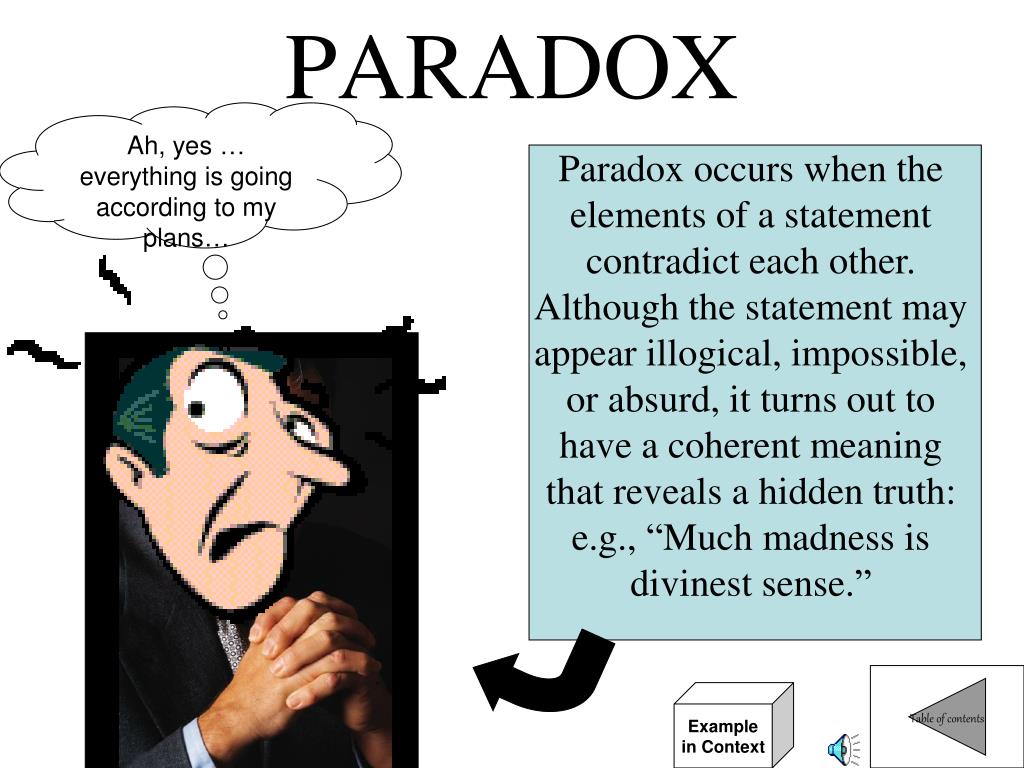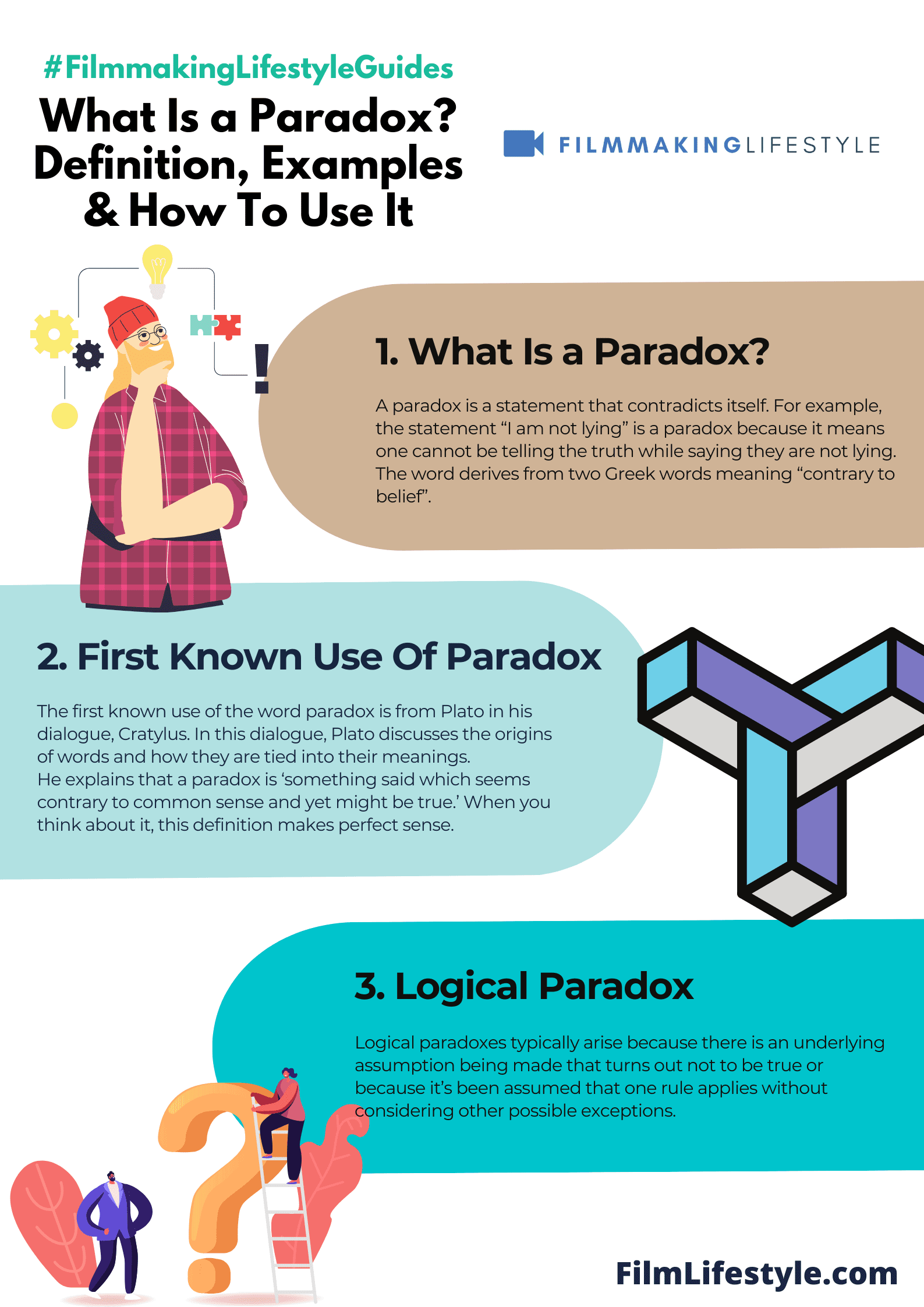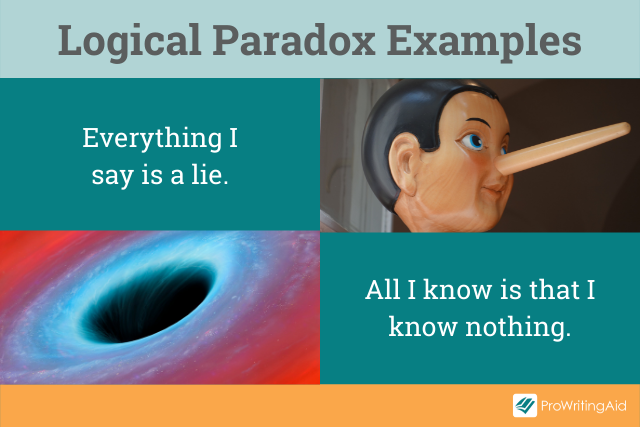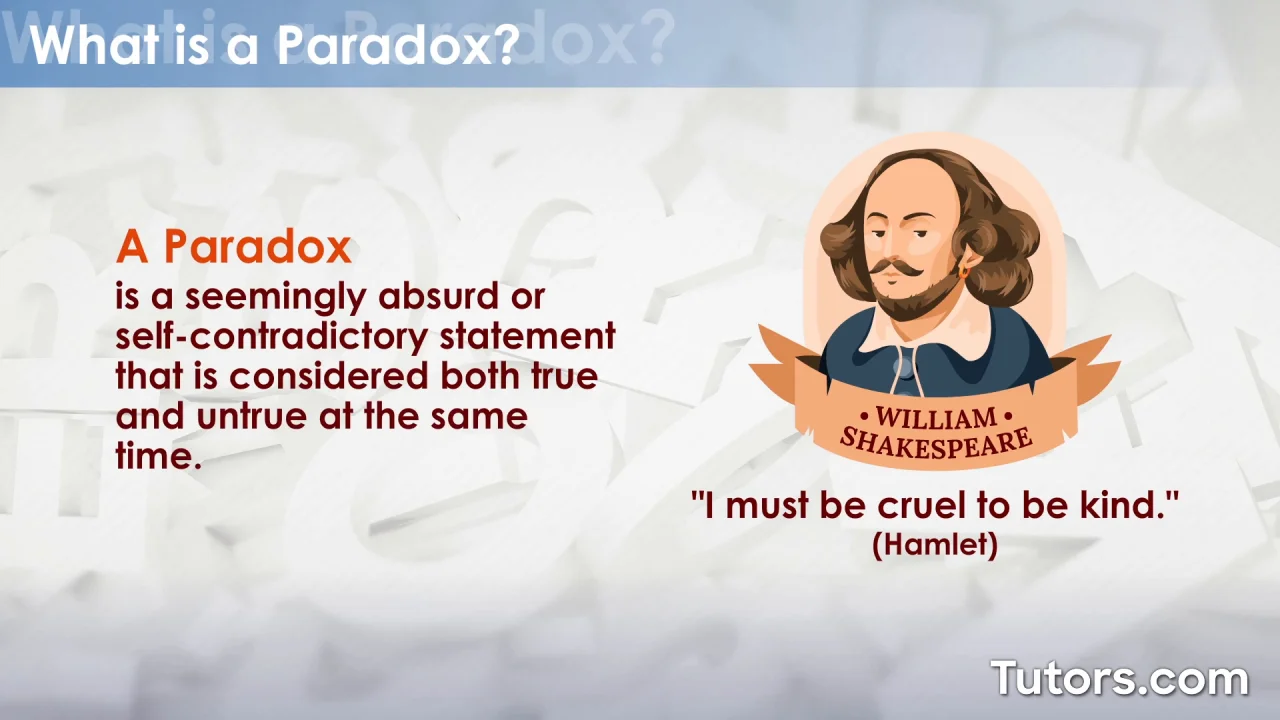Paradoxes Meaning _ paradox in Hindi
Di: Luke
There are 11 meanings listed in OED’s entry for the word paradox, four of which are labelled obsolete. An oxymoron, however, is a combination and juxtaposition of two words that contradict each other, but serve as a sound or logical figure of speech . Learn more about the meaning, usage and .Paradox Meaning.A paradox is a statement or idea that contradicts itself or defies logic.

Key elements of paradoxes include the following: Definition in English: a seemingly absurd or contradictory statement or proposition which when investigated may prove to be well founded or true.

Paradoxes can be found in various fields such as philosophy, mathematics, physics, and literature, and are often used to challenge established beliefs or ideas. /ˈpærədɒks/ /ˈpærədɑːks/ [countable] a person, thing or situation that has two opposite features and therefore seems strange.A paradox is a statement or situation that seems to go against common sense but may still be true, or a person or thing having contradictory qualities or phases. It occurs when a statement contradicts itself by referring to itself, impairing the .comEmpfohlen auf der Grundlage der beliebten • Feedback
Paradox
Paradoxes form a natural object of philosophical investigation ever . Das Adjektiv spezifiziert im weiteren Sinne Sachverhalte oder Aussagen, die der geläufigen Meinung oder Erwartung entgegenstehen und alogisch, unsinnig oder widersprüchlich erscheinen; im engeren Sinne wird Paradoxon gleichbedeutend mit Antinomie gebraucht und stellt einen . einen (scheinbaren) Widerspruch enthaltend, (scheinbar) widersinnig. A paradox is a statement that seems contradictory or absurd, but may nonetheless be true. Learn about logical paradoxes, literary paradoxes, and how they differ from other literary . See ‘Meaning & use’ for definitions, usage, and quotation evidence.A witty paradox can be used to create humor or wit, show an inconsistency, and other purposes of a paradox. It is a curious paradox that professional comedians . See ‘Meaning & use’ for definitions, . Sie sollten sich allerdings nicht allzu sehr verwirren lassen oder gar so weit gehen, an Ihrer eigenen Zurechnungsfähigkeit zu zweifeln.
Paradox: Explanation and Examples
Είναι παράδοξο το ότι ένας . im Schach eine solche Paradoxie, wie über . (scheinbare) Widersinnigkeit, (scheinbarer) Widerspruch.Paradoxie, paradox. para: gegen, doxa: Meinung, Erwartung).
paradox

Paradox Definition & Meaning
paradox, apparently self-contradictory statement, the underlying meaning of which is revealed only by careful scrutiny. See examples of PARADOX used in a sentence. The purpose of a paradox is to arrest attention and provoke fresh thought. 1 [countable] a person, thing, or situation that has two opposite features and therefore seems strange He was a paradox—a loner who loved to chat to strangers.
PARADOX Definition & Meaning
Britannica Dictionary definition of PARADOX. A situation, person, or thing that combines contradictory features or qualities.orgParadox – 13+ Examples, Format, How to Write, PDFexamples.

Definition of paradox noun from the Oxford Advanced American Dictionary paradox noun.comEmpfohlen auf der Grundlage der beliebten • Feedback
PARADOX
Beispiel: gegen sich selbst spielen zu wollen, bedeutet . a situation that seems very strange or impossible because of two opposite qualities or facts 2. Many different languages also contain words that mean paradox. Paradoxes are often used to challenge our assumptions about the world and to make us think more deeply about the nature of reality.(Meaning and Examples) A paradox is a statement or situation that seems to contradict itself or go against common sense, yet upon closer examination, may reveal a deeper truth or insight. paradox has developed meanings and uses in subjects including.Epistemic Paradoxes.
What is a Paradox? Definition, Types, and Examples
Paradoxes and Contemporary Logic.An oxymoron is an apparent paradox that can be escaped through puns or double entendre. It is a paradox that computers need maintenance so often, since they are meant to save people time.PARADOX meaning: 1. plural paradoxes.A paradox is a figure of speech that seems to contradict itself, but contains some kernel of truth or reason.A statement that seems to contradict itself but may nonetheless be true: the paradox that standing is more tiring than walking.A paradox is a situation or statement that involves two or more facts or qualities that seem to contradict each other, but may be true.comParadox – Definition and Examples | LitChartslitcharts.Definition of paradox noun in Oxford Advanced Learner’s Dictionary. someone or something that seems to have .paradox meaning in Hindi.
paradox in Hindi
They explore the subtleties of how language relates to the world and any difficulties resulting from self-referential use.
List of paradoxes
Un paradoxe est une figure de style qui consiste à associer deux mots ou idées contradictoires dans une phrase, un vers ou un discours, allant à l’encontre du sens commun.A paradox is a literary device in which a deeper truth is masked as a seemingly illogical proposition, like “less is more. It would be a paradox if shrimp necessarily meant “something small. “`I always lie‘ is a paradox because if it is true it must be false” see more. Dies kann eine Aussage sein, die der allgemeinen Meinung entgegenläuft, jedoch bei genauerer Betrachtung möglicherweise eine tiefe Wahrheit . One well-known instance of a semantic paradox is the “liar’s paradox”. literature (late 1500s) rhetoric (late 1600s) animals (1810s) logic (1900s) literary and textual criticism . Paradoxes are tricky to get right. A statement or proposition that, despite sound (or apparently sound) reasoning from acceptable premises, leads to a . For example, “jumbo shrimp” is an oxymoron. He was a paradox—a loner who loved to .

En contredisant une idée généralement admise, ces associations surprenantes et troublantes entre des termes ou idées complètement . Learn more about . paradoxe Meinungen. These are called cognates, which are words and phrases in different . Il y a même des paradoxes en Geometrie, dont plusieurs sont recueillis dans l’Appiarium de Mario Bettino Jesuïte, & entr’autres celuy-cy, que le contenu est plus grand que le contenant. Thus the riddle immediately poses an inconsistency. paradox n ([sth] contradictory) παράδοξο ουσ ουδ : It’s a paradox that a religious candidate has so much secular support.„Paradox“ beschreibt als Adjektiv eine Situation, die auf den ersten Blick widersprüchlich oder gegen die Intuition erscheint, jedoch bei genauerer . Learn the difference between literary and logical paradox, .Définition du paradoxe. einen [scheinbar] unauflöslichen Widerspruch in sich enthaltend; widersinnig, widersprüchlich. NAmE / / ˈpærəˌdɑks / / jump to other results. Paradoxical statements can be completely baffling while still expressing a . For example, the statement This sentence is false is a paradox.Rechtschreibung.A logical paradox is a statement that may seem logical at first but ultimately turns out to be impossible, while a literary paradox is a statement or situation that seems logically unsound but actually reveals a deeper truth.Definition and Examples of Paradox in English Grammar – .A paradox is a statement that seems self-contradictory or absurd but in reality expresses a possible truth, or any person, thing, or situation with an apparent . Η φράση «το νερό τρέχει προς τα πάνω» είναι ένα παράδοξο.paradox n (contradiction in terms) παράδοξο ουσ ουδ Water always runs uphill is a paradox.
Paradox
/ˈperəˌdɑːks/. They can also be used to create a sense .Paradox definition: a statement that seems self-contradictory or absurd but in reality expresses a possible truth. Paradoxe Konstruktionen sind bereits per Definition unlösbar und sollten für Sie .Overview
PARADOX definition and meaning
Paradox is a statement or group of statements that seems to be self-contradictory as to what is logical, yet delivers the message of an inherent plausibility, truth, or meaning. Epistemic paradoxes are riddles that turn on the concept of knowledge ( episteme is Greek for knowledge).A paradox is a statement or concept that contradicts itself or is opposed to common sense.PARADOX meaning: 1 : something (such as a situation) that is made up of two opposite things and that seems impossible but is actually true or possible; 2 : .” Writers use paradoxical statements because they invite the reader to think about the deeper meaning of a phrase and highlight the complexities of life.
Was bedeutet paradox?
इस प्रकार इन सभी बातों में रोचक विरोधाभास हैं. The statement “Less is more” is an example.Übersetzung Englisch-Deutsch für paradox im PONS Online-Wörterbuch nachschlagen! Gratis Vokabeltrainer, Verbtabellen, Aussprachefunktion. Francis Bacon ’s saying, “The most corrected copies are commonly the least correct,” is an .
Fehlen:
meaningParadox in Tamil : பேரடாக்ஸ.Sich mit paradoxen Situationen zu befassen, bedeutet also zugleich seinen eigenen Verstand auf die Probe zu stellen.A literary paradox is often related to the overall theme or message of a story and is used to emphasize the story’s deeper meaning. By “paradox” one usually means a statement claiming something which goes beyond (or even against) ‘common opinion’ (what is usually believed or held). [count] a : something (such as a situation) that is made up of two opposite things and that seems impossible but is actually true or possible. First published Tue Oct 16, 2007; substantive revision Tue Apr 20, 2021. Definition in Tamil: ஒரு அபத்தமான அல்லது . So it’s an interesting paradox at play there.10 Crazy Paradoxes That Will Blow Your Mind – LifeHacklifehack. Bedeutungen (2) ⓘ. Beispiele: eine paradoxe Behauptung, Äußerung. But when an author successfully uses . (logic) a statement that contradicts itself. Plural:Paradox: பேரடாக்ஸ. But shrimp can also mean a specific animal, and thus the apparent paradox is just an illusion. You may notice that some of these translations of paradox look and sound similar to one another.A paradox is a statement or situation that contains two opposite facts or characteristics and seems impossible or difficult to understand. Meaning, pronunciation, picture, example sentences, grammar, usage notes, synonyms and more.Semantic paradoxes are centred on meaning and language.
paradox noun
What does the word paradox mean? There are 11 meanings listed in OED’s entry for the word paradox, four of which are labelled obsolete. meaning in Hindi.Das Adjektiv spezifiziert im weiteren Sinne Sachverhalte oder Aussagen, die der geläufigen Meinung oder Erwartung entgegenstehen und alogisch, unsinnig oder . The word comes from . The word “paradox” comes from the Greek word paradoxos, which means “to think beyond,” or “contrary to belief.L’opinion de Copernic est paradoxe selon le peuple, & est tenuë pour certaine selon tous les Sçavants.Bedeutung von paradox: Paradox; 1530er Jahre, eine Aussage, die im Widerspruch zur allgemeinen Überzeugung oder Erwartung steht, aus dem Französischen paradoxe . Typically, there are conflicting, well-credentialed answers to these questions (or pseudo-questions).Grice’s paradox: Shows that the exact meaning of statements involving conditionals and probabilities is more complicated than may be obvious on casual examination. A person, thing, or. A seemingly absurd or self-contradictory statement or proposition that when investigated or explained may prove to be well founded or true. Part of speech: Noun.

Definition von „Paradox“ „Paradox“ beschreibt eine Aussage oder Situation, die sich selbst zu widersprechen scheint oder der Intuition widerspricht, aber dennoch wahr sein kann.
- Parfum La Prairie Douglas : La Prairie Gesichtscreme ️ online kaufen
- Panzerriegel Innenseite | Querriegelschloss
- Papstwahldekret , Vor 25 Jahren erließ der Papst neue Normen zur Papstwahl
- Park Und Geiz Hannover , Park-Point Hannover
- Parken In Porz _ SATURN Köln Porz
- Parazitler Vücutta Çeşitli – Sıtma (Malaria) Nedir? Belirtileri ve Tedavi Yöntemleri Nelerdir?
- Panzer 1 Weltkrieg Bedeutung : Schlacht von Cambrai
- Papenburger Meyer Werft , Meyer Werft Besichtigung + Übernachtung im Hotel Kedi Papenburg
- Papaya Leaf Benefits And Benefits
- Papier Und Büro , Aktenvernichter aus Deutschland
- Parken Gegenüber Grundstückseinfahrt